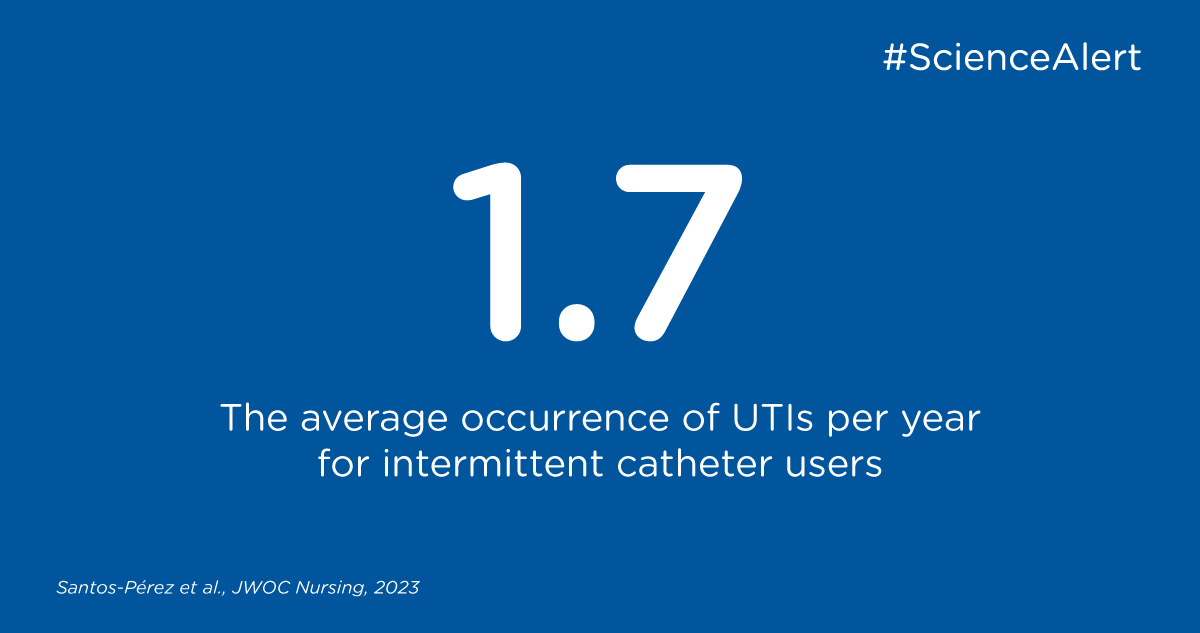Publication Highlight Santos-Pérez, Journal of Wound, Ostomy & Continence Nursing, 2023, Vol 50 (5), 400-405
This publication by Santos-Pérez and co-workers explores the health-related quality of life and the self-reported complications associated with intermittent catheterisation (IC).
Introduction to the study
The study is an observational, cross-sectional study of 50 IC users treated at a hospital in Madrid, Spain. IC was used by all participants for chronic urinary retention, with the majority of participants having a congenital birth disorder such as spina bifida or myelomeningocele. The study also included patients with non-neurogenic bladder dysfunction (related to a weak bladder muscle or a blockage in the flow of urine), as well as spinal cord injured individuals and a few individuals with neurological diseases such as Parkinson's disease or multiple sclerosis. The mean age of the study participants was 49 years with the majority being females.
Collection of clinical data
The data was obtained by utilising the Intermittent Self-Catheterisation Questionnaire (ISC-Q). This instrument assesses 4 domains of self-catheterisation-related QoL (ease of use, convenience, discreetness, and psychological well-being).In addition, a simplified version of a questionnaire designed by Håkansson and co-workers Health Care Utilisation and Complications Rates among Users Of Hydrophilic-Coated Catheters - PubMed (nih.gov) was used whereby participants were asked how frequently they had been treated for catheter-related complications, with infections being the main focus. Urinary tract infection (UTI) was defined as the presence of 1 or more symptoms (fever, flank pain, dysuria, urgency, haematuria) and an altered urinary sediment or a positive urine culture.
The following types of catheters were used by the individuals enrolled in the study: Wellspect (Lofric Elle, Origo, Sense). BBraun (Actreen), Coloplast (Speedicath) and Hollister (Onli). The choice and prescribed catheter was based on anatomic and functional considerations as well as patient preference.
How does IC affect health-related quality of life?
A vast majority of respondents found their catheter easy to use and easy to prepare (98%). 96% also reported that the design of the product facilitated insertion and that the lubricated surface facilitated the procedure. All of this contributes to a feeling of confidence in their ability to use it for self-catheterisation. Most of the participants (78%) also found it easy to bring the catheters needed for daily use and use them discreetly outside of the home. Psychological well-being is an important parameter for individuals having to catheterise several times a day and often for a lifetime, as much as 98% agreed that self-catheterisation was necessary for them to maintain good health.
The results from the current study are in line with findings that point to IC as the gold standard for bladder management.
Which are the participant-reported complications related to IC?
In terms of complications, the most frequently reported were symptomatic urinary tract infections (UTIs), with an average of 1.7 UTIs in the last year. IC is preferred over indwelling catheterisation and numerous studies have reported a lower risk of symptomatic UTI among patients using IC, compared to indwelling. However, UTIs may still be a problem. In the current study 62% reported having at least 1 symptomatic UTI in the last year and 36% required medical care for their symptoms.

The self-reported questionnaires showed low incidences of other complications such as epididymo-orchitis, urethral stenosis and urethral bleeding. In the current study less than 5% of participants reported such complications, which falls within the same range that Håkansson's group identified. On the other hand, bladder stones were more frequent in this study compared to Håkansson, although low compared to incidences of 10% to 28% of bladder stones described in other studies.
IC as a way to feel self confident
This study sought to determine health-related quality of life and self-reported complications associated with IC.The findings point to a low frequency of IC-related complications, both in patients with neurogenic as well as non-neurogenic causes of incomplete bladder emptying.Interestingly, almost all participants reported high rates of agreement (76%- 98%) concerning IC in terms of ease of use and self-confidence. A few participants reported that having to perform IC created a restrictive feeling when visiting friends and family. This highlights the potential psychosocial impact of IC on individuals.
Summary
Overall, the study by Santos-Pérez et al., concluded that participants managed by IC for chronic urinary retention reported that IC was important to their health and that they felt confident in their ability to perform IC. The majority of respondents found preparation for catheterisation to be simple, and most found the catheter insertion process easy. The incidence of complications, apart from UTIs, was relatively low. This information provides valuable insights into the experiences of individuals undergoing IC and can guide healthcare professionals in optimising patient care and support.